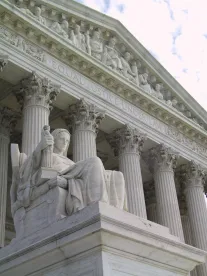The U.S. Supreme Court’s decision yesterday in Merrill Lynch v. Manning clarified the scope of federal jurisdiction under the Securities Exchange Act in certain important respects, but also left open critical issues that may arise in future cases. Although the Court rejected federal jurisdiction in resolving the sole issue that was before it, the Court also stated that federal courts might well have jurisdiction over state law claims that “necessarily raise” substantial issues under federal law.
The decision, however, provides little guidance as to how that standard may be applied. Future cases involving securities trading, and the extensive body of federal regulation governing that activity, may well require future courts to determine that issue.
The Scope of the Manning Decision
As previously reported on this blog, the sole issue before the Manning Court was the scope of Section 27 of the Exchange Act, which provides federal courts with exclusive jurisdiction over all actions “brought to enforce any duty or liability” under the Exchange Act. The Court interpreted that provision to be co-extensive with the general federal jurisdiction statute, 28 U.S.C. § 1331, which grants federal courts jurisdiction over all civil actions “arising under” federal law.
In other words, where an action “arises under” the Exchange Act within the meaning of § 1331, the federal courts will have exclusive jurisdiction under § 27 of the Exchange Act. Where, however, the action does not “arise under” the Exchange Act within the meaning of 28 U.S.C. § 1331, there is no independent basis for federal jurisdiction under § 27 of the Exchange Act.
The Supreme Court also articulated, but did not have reason to apply, the standard for determining whether a case “arises under” federal law. Typically, federal jurisdiction attaches where federal law creates the cause of action that is asserted. However, even where state law creates the claim, prior Supreme Court decisions have held that an action will be deemed to have “arisen” under federal law where the state law claim “necessarily raises” a federal issue that is “actually disputed and substantial,” which a federal court may entertain without disturbing the “congressionally approved balance of federal and state power.”
The Manning Court did not provide guidance how to apply the “arising under” standard because that issue was not before the Court. The Third Circuit decision from which the appeal was taken had held that plaintiffs’ state law claims did not “necessarily raise” issues of federal law and therefore did not “arise under” federal law. Defendants did not appeal from that aspect of the decision, and the Supreme Court made no determination as to whether the Third Circuit’s decision on that issue was correct.
The Claims Asserted In Manning
The plaintiffs in Manning were shareholders in a public company who claimed that the value of their shares declined as a result of a practice known as “naked short selling,” allegedly facilitated by the financial institution defendants. In a typical (i.e. non-naked) short sale, the seller borrows securities, and sells the borrowed securities in the market, delivering them to the purchaser within the three-day settlement period. At some later date, the seller purchases replacement securities in the market for return to the lender, and will realize a gain if the price of the securities declined between the time of the short sale and the purchase of replacement securities. In a naked short sale, by contrast, the seller does not borrow the securities in time to make delivery within the three-day settlement period, which may result in what is referred to as a “fail to deliver.”
Naked short selling is not illegal per se and is governed by SEC Regulation SHO. Among other provisions, Reg SHO attempts to minimize fails to deliver by imposing certain “locate” and “close- out” requirements on broker dealers. The locate requirement generally requires a broker dealer to have reasonable grounds to believe that the security can be borrowed and delivered within the three day settlement window before executing a short sale. Under the close-out requirement, a broker-dealer may have to purchase and deliver securities of like kind and quality if the failure to deliver continues for thirteen days.
The plaintiffs initially brought suit in New Jersey state court, asserting claims arising under New Jersey law alleging that the naked short sales constituted illegal market manipulation, causing the value of their shares to decline. The complaint contained extensive allegations that defendants’ conduct violated Reg SHO, and the defendants removed the action to federal court. On appeal from a motion to remand the matter to state court, the Third Circuit held that, notwithstanding plaintiffs’ extensive references to Reg SHO, the claims did not “necessarily raise” federal issues. The Court of Appeals reasoned that the plaintiffs ultimately might be able to prove a market-manipulation scheme that was illegal under New Jersey law independent of any violations of federal regulations. The Third Circuit’s reasoning on this issue was not addressed by the Supreme Court.
In the highly regulated securities arena, and the arena of securities trading more particularly, claims asserted under state law may increasingly seek to impose liability for conduct subject to extensive federal regulation. The question of whether a state law claim “necessarily raises” an issue of federal securities law may continue to be litigated in a variety of future contexts.



 />i
/>i

